SingaporeMotherhood | Parenting
June 2023
Physiotherapy for Women’s Health Issues in Singapore
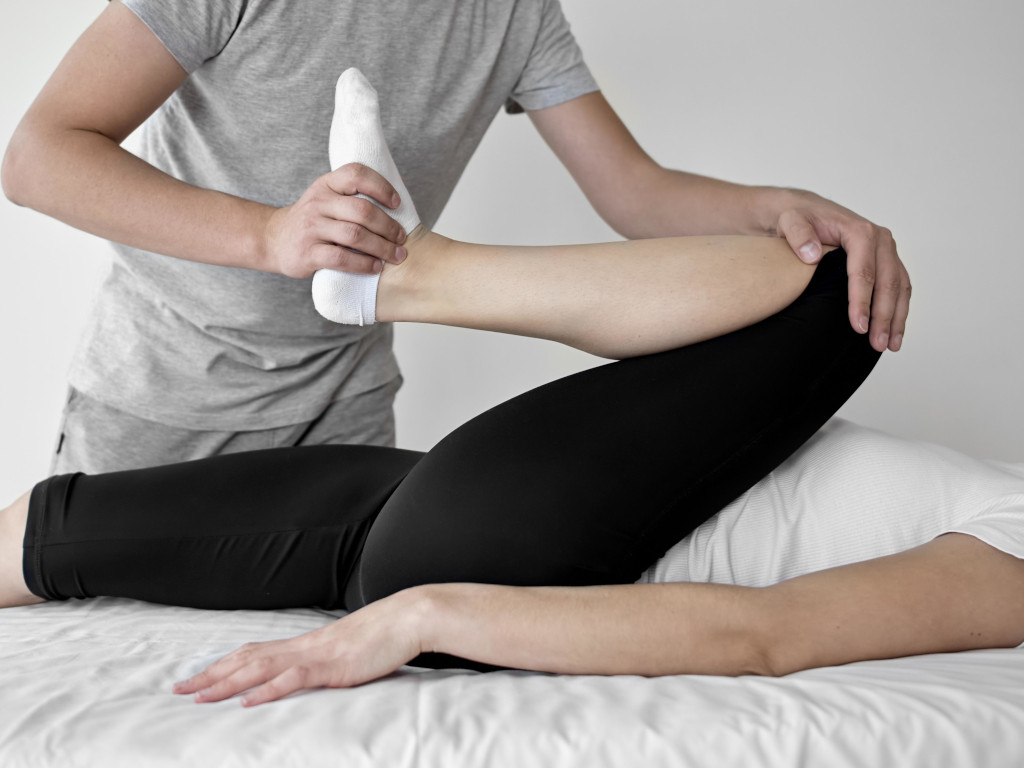
When we think of physiotherapy, the first thing that often comes to mind is recovery from injury. But beyond physical injury, there are a host of issues that physiotherapy can help with. These range from chronic back and neck pain that come hand-in-hand with our increasingly sedentary lifestyles, to post-surgery rehabilitation.
However, one of the less widely discussed topics of physiotherapy is its role in women’s health. Physiotherapy specially catered for women’s health issues can help treat pelvic or vaginal pain, prenatal and postpartum musculoskeletal pain, and osteoporosis, among other conditions. Read on to find out how physiotherapy can improve women’s health and which physiotherapy clinics in Singapore specialise in women’s health issues.
(See also: Say Goodbye to Pain, and Hello to Wellness for everyone in the Family)
What is Physiotherapy?
Physiotherapy is a form of treatment that helps restore, maintain, and maximise strength, function, movement, and overall well-being. People of all ages and at any stage of life can benefit from physiotherapy.
Physiotherapists are allied health professionals who understand how our body works. They are trained to assess, diagnose and treat physical ailments. Depending on your needs and mobility, there are various techniques that a therapist may use to treat and manage your condition. These include manual therapy, dry needling, ultrasound, traction, movement, hydrotherapy, exercise, and more.
How Physiotherapy can Help with Women’s Health Issues
In the past, women’s health physiotherapy heavily focused on pregnancy-related conditions such as back pain and pelvic pain during pregnancy. However, it is increasingly common to use physiotherapy as a form of treatment for other women’s health issues, including sexual dysfunction, menopause-related challenges, and conditions relating to the pelvic floor.
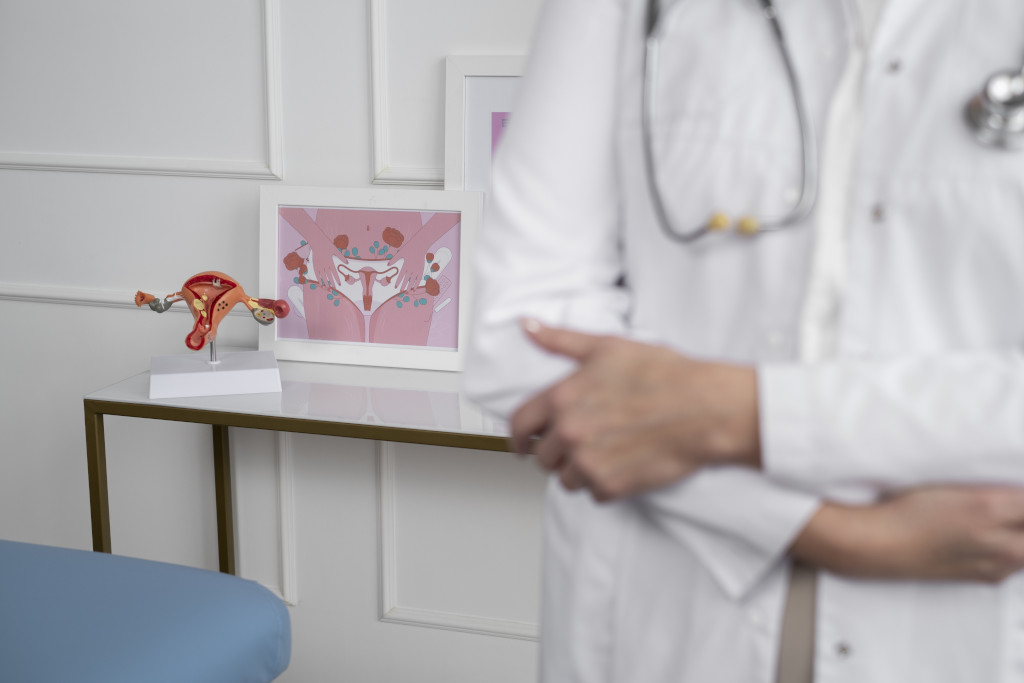
Physiotherapy can help with the management and prevention of certain women’s health issues, including:
Antenatal (pregnancy) and postnatal care
Regular exercise is beneficial for our overall well-being. Specifically in pregnant women, it can reduce complications such as gestational diabetes, hypertension, and excessive weight gain. Physiotherapists play a crucial role in antenatal and postnatal care as they can prescribe a safe and personalised exercise plan to keep both the mum and baby healthy.
Pelvic organs prolapse
Pelvic organ prolapse (POP) occurs when the tissue and muscles of the pelvic floor are no longer able to support the pelvic organs in their normal positions. This condition is often asymptomatic and may go unnoticed until it reaches severe stages. While POP can affect anyone, women face an increased risk, especially after childbirth. Using pelvic floor muscle training and pessary support, physiotherapy can be a non-surgical option in managing POP.
Sexual dysfunction
Women facing sexual dysfunction require a holistic treatment approach, which may include physiotherapy. Pelvic floor muscle training can improve blood flow to vulvovaginal tissues, which helps the muscles relax, thereby reducing pain and dryness. Physiotherapists can also educate individuals to be more aware of the difference between tense and relaxed muscles.
(See also: Is Female Sexual Dysfunction (FSD) making it hard for you to have sex and get Pregnant?)
Osteoporosis
Hormone changes during menopause affect bone density, putting post-menopausal women at a higher risk of osteoporosis. Physiotherapy can help by introducing targeted exercises that improve strength, balance and flexibility, thus reducing the risk of fractures and preventing further bone loss.
Urinary incontinence
Urinary incontinence can be an embarrassing experience and has even been associated with an increased risk of depression. However, it is not uncommon. In fact, one in three women experience urinary incontinence at some point in their life. Urinary incontinence in women often happens as a result of weak pelvic floor muscles or damage to the connective tissue supporting the bladder.
Mums and mums-to-be commonly face incontinence as their body accommodates a growing baby, placing pressure on the bladder. With the use of pelvic floor exercises, vaginal cones and/or electrical stimulation, physiotherapy can be a non-surgical solution to urinary incontinence.
Pre- and post-menopause
Women undergo significant physical, emotional, and physiological changes during menopause. Many physical symptoms of menopause can be managed by physiotherapy. Aerobic exercises, stretches, and massages can help with excessive weight gain, insomnia, and hot flashes. Targeted exercises and treatment can also help to improve strength and flexibility, reducing muscle and joint pains.
Other examples of women’s health issues that physiotherapy can help with:
- Premenstrual syndrome
- Endometriosis
- Polycystic ovary syndrome
- Depression
- Pelvic, perineal, vulvar and abdominal pain
(See also: Pregnancy Aches and Pains)
What to Expect When You Go for Physiotherapy
First and foremost, physiotherapy goes beyond exercise. It uses a range of tools and techniques such as ultrasound, manual therapy, and traction for treatment. Understanding the process can help to ease your nerves and help you make an informed decision on whether women’s health physiotherapy is what you are looking for.
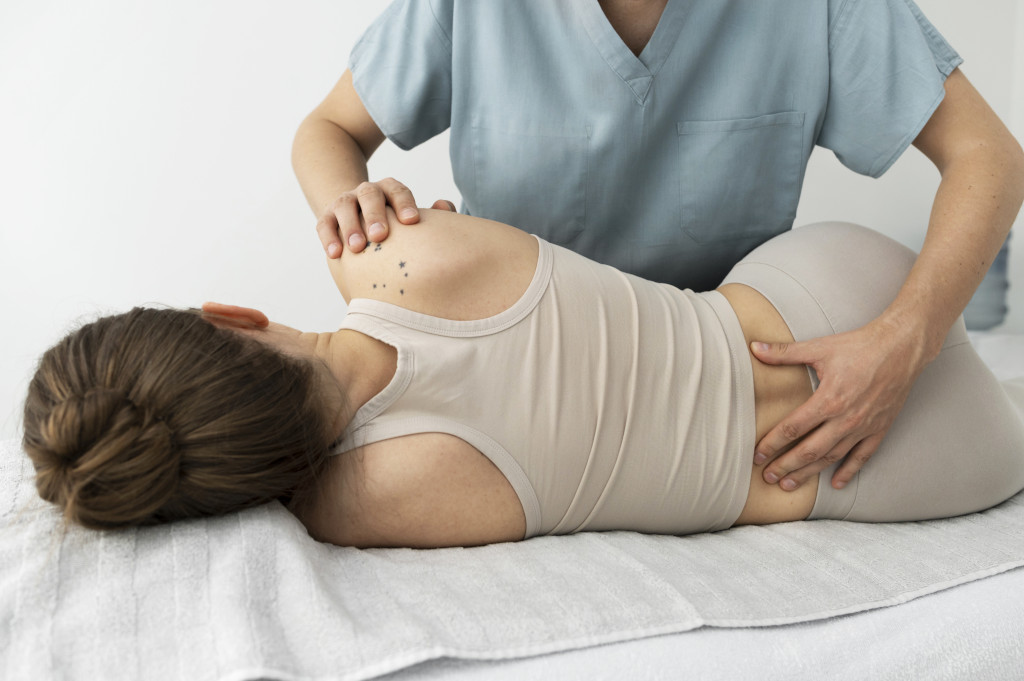
Here are some things to expect and prepare for your physiotherapy visit:
Before the visit
Initial consultations tend to take longer than follow-up visits. They usually take 45 minutes to an hour depending on the physiotherapist and your individual needs. So do be sure to adjust your schedule accordingly.
Physiotherapy sessions may be covered by MediSave or insurance. Visit your GP for a referral if you need one.
On the day of your physiotherapy session, dress in comfortable attire since you will likely be performing light, low-impact exercises.
If you’re pregnant: When making an appointment, do check that the clinic of choice supports therapy for pregnant women. However, note that certain treatment options such as traction, ultrasound, and shockwave therapy may not be available to pregnant mums. Certain drugs and painkillers are prohibited as well.
During the visit
During the initial consultation, your physiotherapist will begin by asking questions about your health, medical history, and your goals of treatment. Be open with your therapist so they know how to best help you.
Women’s health issues may not be the most glamorous of topics to discuss, but there’s nothing to be embarrassed about. Remember that your physiotherapist has seen many clients across their years of experience. This means the issues you are facing are not uncommon to them. Furthermore, they are required to keep your information confidential.
Understandably, many get nervous or uncomfortable when it comes to pelvic examinations. To demystify this process, a pelvic examination may involve the insertion of a gloved finger into the vagina to apply light pressure, or simply an observation of the area. Always let your physiotherapist know how you are feeling, so they can address your concerns and reassure you. If it helps, bring a loved one along with you to sit in during the session.
(See also: I Dream of Gynae – How to Choose Dr Right when You’re Pregnant)
After the visit
Your physiotherapist may prescribe a set of exercises to do at home. For the best results, do be sure to follow the treatment plan accordingly.
Physiotherapy rarely ends after a single session, as it takes time to see results and achieve your goals. Depending on your condition and treatment goals, your physiotherapist may be able to advise you on the estimated number of sessions required after the initial consultation.
Many people don’t follow through with the full course of physiotherapy, which can render treatment ineffective. If you find it a hassle to make multiple trips to the clinic, consider home physiotherapy sessions where certified physiotherapists come to you instead.
Best Physiotherapy Clinics for Women’s Health Issues in Singapore
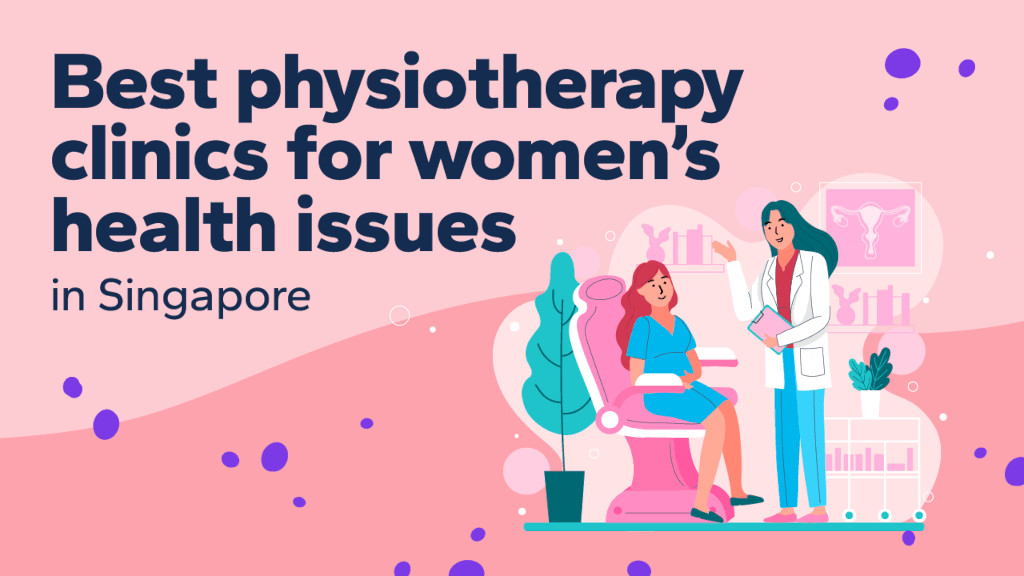
Embrace Physiotherapy
Embrace Physiotherapy is a specialist clinic that caters exclusively to women. The team is 100 per cent led and run by passionate women with a resolve to make sure nobody with pain or pelvic floor dysfunction suffers in silence. On top of the usual physiotherapy qualifications, the team at Embrace have also completed post-graduate training in pelvic health or are working towards it. Besides physiotherapy, Embrace also offers pre- and post-natal exercise classes and Pilates, telehealth services, and dry needling.
Where 410 Joo Chiat Road
Call 9780 7274
Web www.embracephysio.sg
Health 2 U
With a multidisciplinary team of therapists, yoga trainers, and nutritionists, Health 2 U provides a wide range of services. These include physiotherapy, sports massage, baby massage, Pilates, personal training, and nutritional therapy. Its central location and home therapy services ensure that convenience is not an issue. Taking it one step further, Health 2 U also has a dedicated Health2Mama team to support mums through pregnancy and after birth, both at home and in-clinic.
Where #03-01, 101B Telok Ayer Street | #03-01A, Phoenix Park, 308 Tanglin Road
Call/WhatsApp 8358 2144
Web www.health2u.sg
Physio Focus
Physio Focus has a small but experienced team of physiotherapists and sport masseuses. They provide personalised therapy for conditions ranging from sports injuries and chronic pain to post-surgery recovery, as well as developmental disorders in children. In the field of women’s health, Physio Focus specialises in pregnancy-related back pain, stress incontinence, and osteoporosis treatment and prevention.
Where #07-01, Forum Office Tower, 583 Orchard Road
Call 6734 8151 | WhatsApp 9168 5539
Web www.physiofocus.com.sg
Physio Down Under
Physio Down Under is a clinic that solely specialises in women’s health physiotherapy. They provide comprehensive services for common conditions that mothers and women in general face. This includes urinary incontinence, pelvic organ prolapse, pelvic floor muscle dysfunction, pelvic pain, bowel disorders, abdominal muscle separation, pregnancy-related musculoskeletal issues, blocked milk ducts, and menopause. Their eight-session Pink Ribbon Program provides breast cancer rehabilitation for women with or recovering from breast cancer.
Where #04-01A, Valley Point Office Tower, 491B River Valley Road
Call 6980 8384
Web www.physiodownunder.sg
(See also: Mammograms in Singapore – Subsidised Breast Cancer Screening Programmes & Costs)
Physio Asia Therapy Centre
With clinics located in central and east Singapore, plus home-based services, Physio Asia Therapy Centre makes physiotherapy a fuss-free experience. Highly experienced therapists, some with over 30 years of clinical experience, are well-versed in a wide range of treatment techniques for different health conditions. Physio Asia supports women in the following areas: pelvic floor health, musculoskeletal conditions, pregnancy-related breast issues, ergonomics, and pre- and post-natal exercises.
Where #05-02 International Building, 360 Orchard Road | #B1-19 Siglap Centre, 55 Siglap Road
Call 6736 4142
Web www.physioasia.com
UrbanRehab
UrbanRehab offers a full range of services which spans physiotherapy, hand therapy, podiatry, personal training, clinical Pilates, massage therapy, chiropractic, and TCM. Its Women’s Health Physiotherapy division is dedicated to managing pregnancy-related musculoskeletal conditions, pains and discomfort. Females of any age facing musculoskeletal problems, urinary incontinence, poor posture, pain, and the like can consult.
Where 6 outlets at RB Capital Building, Marina Bay Financial Centre, Royal Square Novena, Paragon Medical Centre & Ngee Ann City Tower B
Call/WhatsApp 8816 1244
Web www.urbanrehabphysio.com
Singapore Physio
Singapore Physio specialises in endurance sports, knee injuries, back and neck pain, post-operative care, and women’s health. Specific to women’s health, physiotherapists at Singapore Physio can help with musculoskeletal issues associated with pregnancy, birth, postpartum, and breastfeeding, as well as pelvic floor muscle issues and pelvic pain. Telehealth services are available as well.
Where #06-09 Camden Medical, 1 Orchard Boulevard
Call 6887 4190 | WhatsApp 9738 3874
Web www.singaporephysio.com
UFIT
With a team of over 100 coaches and clinicians, UFIT is an integrated health and fitness outfit. Their pre- and post-natal team specialises in the management of issues that new and soon-to-be mums commonly face. These include back and neck pain, pelvic discomfort, carpal tunnel syndrome, pubic symphysis dysfunction, De Quervain’s Tenosynovitis, and rectus abdominis diastasis. Pre- and post-natal personal training programmes are available as well.
Where 4 outlets at Club Street, Orchard, one-north & City Hall
Call 6225 5059 (Club Street) | 6509 0057 (Orchard) | 6250 2944 (one-north) | 9646 9501 (City Hall)
Website: https://www.ufit.com.sg/pre-post-natal
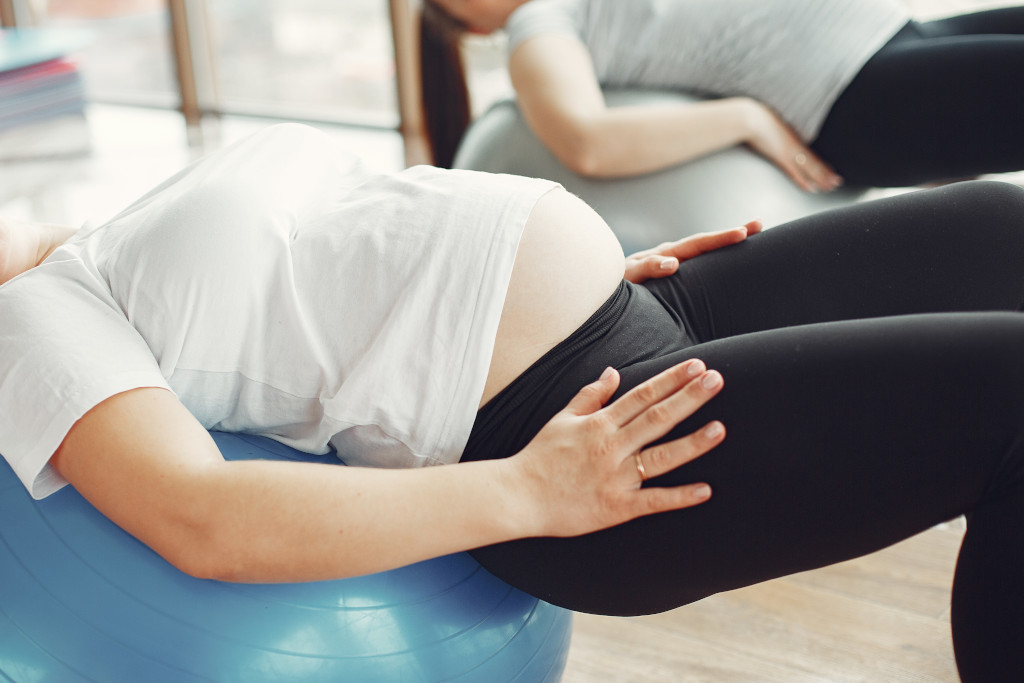
Why You should Consider Physiotherapy for Women’s Health Issues
Taking the first step to engage a physiotherapist for women’s health issues can be daunting. These days, you might even attempt to diagnose and treat yourself with ‘Dr Google’ instead.
While following online workout tutorials for your women’s health issues is an option, exercises like pelvic floor muscle training are most effective when done right. Therefore it’s best to have a trained physiotherapist to guide you along and provide personalised advice. Misinformation is also rife online, so it’s best to consult a professional.
Maintaining overall well-being is important for everyone, but especially for those with women’s health issues. And even more so for new and soon-to-be mums. A holistic approach is the best treatment for women’s health problems. Tapping on a multidisciplinary team of doctors, physiotherapists, and nutritionists often produces the most effective results.
This article first appeared on Homage, an award-winning personal care solution that provides on-demand holistic home and community-based caregiving and medical services to seniors and adults, allowing them to age and recover with grace, control, and dignity.
Featured image: Freepik
All content from this article, including images, cannot be reproduced without credits or written permission from SingaporeMotherhood.
Follow us on Facebook, Instagram, and Telegram for the latest article and promotion updates.





